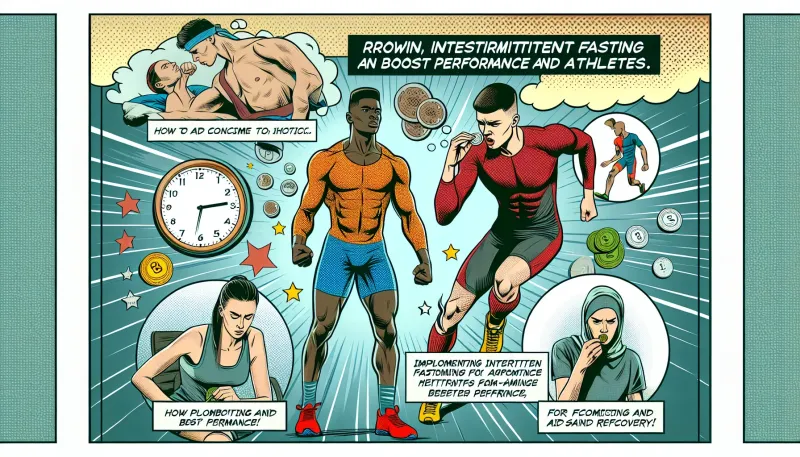Intermittent Fasting for Athletes: Boosting Performance and Recovery

Discover how intermittent fasting can enhance athletic performance and recovery. Learn the science, benefits, and practical tips for athletes.
Intermittent fasting (IF) has emerged as a popular eating pattern, promising numerous health benefits. Among athletes, the practice is gaining traction for its potential to boost performance and recovery. This article delves into the science behind intermittent fasting for athletes, its benefits, and practical tips for implementation.
What is Intermittent Fasting?
Intermittent fasting involves cycles of eating and fasting periods. Unlike conventional diets that focus on what to eat, IF centers on when to eat. Common methods include the 16/8 method (16 hours fasting, 8 hours eating), the 5:2 method (five days of regular eating, two days with restricted calories), and the Eat-Stop-Eat method (24-hour fasts once or twice a week).
The Science Behind Intermittent Fasting
Research indicates that intermittent fasting may influence several physiological processes beneficial to athletes. These processes include improved metabolic health, increased human growth hormone (HGH) production, and enhanced fat oxidation. Let's examine these in more detail.
Metabolic Health Improvements
Intermittent fasting can enhance metabolic flexibility, allowing the body to switch more efficiently between burning carbohydrates and fats for fuel. This flexibility is crucial for athletes who require sustained energy.
Increased Human Growth Hormone (HGH) Production
HGH is vital for muscle growth, fat metabolism, and recovery. Research shows that fasting can significantly increase HGH levels, potentially enhancing muscle repair and recovery post-exercise.
Enhanced Fat Oxidation
During fasting, insulin levels drop, leading the body to utilize fat stores for energy. This process can help athletes improve body composition by reducing fat mass while preserving lean muscle mass.
Benefits of Intermittent Fasting for Athletes
Let's explore the specific benefits intermittent fasting offers to athletes:
Improved Endurance
Fasting boosts mitochondrial biogenesis—the creation of new mitochondria—which can enhance endurance performance. By optimizing mitochondria function, athletes may experience increased stamina and reduced fatigue.
Enhanced Recovery
Intermittent fasting may reduce inflammation, aiding in faster recovery post-exercise. The increased HGH production also contributes to quicker muscle repair and growth.
Optimized Body Composition
Intermittent fasting can lead to reductions in body fat percentage, an essential factor for athletes needing to maintain a specific weight class or optimize power-to-weight ratio.
Mental Clarity and Focus
Many athletes report improved mental clarity and focus when practicing intermittent fasting. This cognitive benefit can be crucial during training and competition.
Practical Tips for Athletes Implementing Intermittent Fasting
For athletes eager to integrate intermittent fasting into their regimes, consider the following tips to maximize benefits and minimize potential drawbacks:
Choose the Right IF Method
Select an intermittent fasting method that fits your lifestyle and training schedule. The 16/8 method is often a good starting point for athletes as it allows for a daily eating window that can sync well with training sessions.
Prioritize Post-Workout Nutrition
Ensure adequate nutrient intake post-exercise to support recovery. If you train in a fasted state, plan to consume a balanced meal with proteins and carbohydrates soon after to replenish glycogen stores and facilitate muscle repair.
Stay Hydrated
During fasting periods, dehydration can become a risk, especially for athletes. Drink plenty of water and consider electrolyte supplementation if necessary.
Listen to Your Body
Pay attention to how your body responds to intermittent fasting. If you notice decreased performance or prolonged fatigue, adjust your eating window or consider alternative nutritional strategies.
Consult a Nutrition Expert
Working with a dietitian or nutritionist who understands the demands of athletic performance can provide personalized guidance and ensure your nutritional needs are met.
Common Challenges and Solutions
While the benefits are compelling, athletes may face challenges when adopting intermittent fasting. Here are some common issues and solutions:
Feeling Weak or Fatigued
If you experience weakness or fatigue, extend your eating window or focus on nutrient-dense foods during eating periods. Incorporating carbohydrates around your workouts can help maintain energy levels.
Performance Plateaus
If performance stalls, reevaluate your fasting and training schedule. Introducing refeed days, where you increase calorie and carbohydrate intake, may help overcome plateaus.
Social and Lifestyle Constraints
Intermittent fasting can sometimes interfere with social activities. Planning ahead and communicating your dietary choices with friends and family can alleviate social pressures and ensure adherence.
Conclusion
Intermittent fasting presents a promising approach for athletes aiming to enhance performance and recovery. By strategically timing meals and fasting periods, athletes can optimize metabolic health, improve body composition, and experience mental clarity. However, it's crucial to listen to your body and consult professionals to tailor the fasting protocol to individual needs. Embrace the science and practical tips outlined in this article to harness the full potential of intermittent fasting in your athletic journey.



























